I’m a bit drowsy today, campers; blame the lowering skies of a gray Seattle spring day. All I want to do is curl up with a cat or two and a new release by a promising first-time author. I would even feel virtuous doing that, because, let’s face it, if we all want to live in a world that’s open to giving a fresh voice a break, it’s incumbent upon all of us to keep buying debut novels.
Oh, you hadn’t thought about it in those terms? Trust me, agents and editors do. They have to: those books are their bread and butter. And if you hope someday for a book to be your bread and butter, getting into the habit of supporting first- and second-time authors in your chosen book category is the single best way to encourage the agent and editor of your dreams to keep an open mind toward books like yours.
That’s more than enough moral reasoning for a sleepy day, I think. Since I don’t have Millicent’s ever-present too-hot latte in my hand, I’m going to devote today’s post to the kinds of faux pas that tempt her to keep downing them: opening pages that lull her into a deep, refreshing slumber. Or at least a jaw-cracking yawn.
I know, I know — this one couldn’t possibly apply to any of my readers, all of whom are as scintillating as scintillating can be, both on and off paper. Yet strange to report, agents, editors, and their respective screeners routinely report finding many submissions snore-inducing. In fact, slow openings are common enough in submissions that no discussion of notorious pet peeves would be complete without some serious discussion of them.
Thus Millicent’s oft-burnt tongue: she’s just trying to stay awake. Not only due to the dreaded-yet-ubiquitous slow opening — you’d be astonished at how many manuscripts don’t really get going for 4, 5, or 23 pages — but also because once one has been reading submissions or contest entries for a while, the sheer repetition of certain premises begins to…be…
Oh, I’m sorry: did I nod off for a moment?
Frankly, I do not think we writers talk enough amongst ourselves about either of these widespread narrative problems. There’s a awfully good reason for that: since writers commit to spend months or years with a story, we’re usually pretty taken with the story. And nothing renders a section of prose more interesting than agonizing over every word choice, sentence structure, and comma.
So who can blame us if we don’t really notice that nothing much happens on page 1? Or Chapter 1? Or — and this is even harder for a self-editor to catch — if our openings employ similar narrative tricks to hook the reader’s attention and/or stray into plot territory that Millicent has already seen claimed by a few dozen aspiring writers within the last week?
Given how frequently similar tactics and premises crop up in submissions — and how very frequently those of us who read for a living complain about it to one another in private — it’s astonishing how infrequently agents, editors, or even writing coaches bring these problems to aspiring writers’ attention. Perk up your ears the next time you’re at a writers’ conference: when the pros give advice about how to guide manuscripts through the submission process relatively unscathed, the rather sensible admonition don’t bore me is very seldom heard.
Perhaps we can chalk this up to a natural reluctance to admit in a room stocked to the brim with the authors of tomorrow just how little they read of most manuscripts before rejecting them: as those of you who have been hanging around Author! Author! for a while already know, the average submission gets rejected on page 1; one doesn’t hear that mentioned much at conferences, either. And I can easily imagine how an agent might feel a tad sheepish about implying in front of a group of total strangers that he has an attention span that would embarrass most kindergarteners. Or that on certain mornings, the length of time it takes to bore a screener is substantially shorter than others, for reasons entirely beyond the writer’s control.
Hey, they don’t call it the city that never sleeps for nothing, you know. But heaven forfend that an agent should march into an agents’ forum the morning after a long night of the kind of conferring that often happens in the bar that’s never more than a hundred yards from any writers’ conference in North America and say, “Look, I’m going to level with you. If I’m dragging into the office on three hours of sleep, your first page is going to have to be awfully darned exciting for me even to contemplate turning to the second. Do yourself a favor, and send me an eye-opening page 1, will ya? Now where is that conference volunteer with my COFFEE?”
On an entirely unrelated note, had I mentioned to those of you planning to give pitches at upcoming conferences that you might not want the first appointment of the day? Or one of the first several? (You didn’t hear it from me, but at the writers’ conference thrown annually in my neck of the woods, enough conferring goes on that on one memorable occasion, only two of the scheduled dozen or so pitch-hearers showed up for the scheduled morning pitch sessions. If we are to believe the agent who is still complaining about no one having told him that he could have slept in that day.)
Obviously, there’s nothing a writer can do about it if his page 1 — or morning pitch, for that matter — is being judged by someone in desperate need of a gallon of coffee and a B-12 shot, but one can maximize the probability of being the manuscript that makes Millicent’s eyes fly open. One of the best ways of doing this is to avoid having your page 1 read like 4 out of the 16 first pages she has already screened that morning. Or like a third of what she has read in the last week. Even an innocuous writing or formatting problem may begin to annoy a professional reader after she has seen it 700 times.
In response to what half of you just thought very loudly: no, someone who has not had the experience of reading that many first pages probably would not know what those often-repeated problems are. (Although keeping up with new releases in one’s chosen book category would be an excellent means of learning what is and isn’t considered an outdated type of opening.) But yes, the pros honestly do believe that a serious writer would have taken the time to learn her craft well enough to avoid falling into these traps.
Oh, you thought I had devoted so many weeks of posts to common page 1 pet peeves because I liked chatting about them? I’m just trying to give you a peep into what it’s like to hold Millicent’s job.
They also expect, and with greater justification, that a talented writer with a strong premise won’t bore them before the bottom of page 1 — which is not by any means as easy as it sounds. These people see a LOT of plots, after all; if a Millicent is experienced enough to be able to tell from the first reference to a character’s hard childhood that he’s going to turn out to be the perpetrator of those seemingly random murders of everyone who was mean to him as a kid, it’s going to be difficult to keep her interested in the mystery.
And if that reference crops up on page 1 — as happens astonishingly often with plot flares — can you really blame her for muttering, “Well, I’ve seen this before; I want to see something fresh. Next!”
Okay, so maybe you can blame her, if it happens to be your submission over which she is muttering like one of the witches in Macbeth. But you can see why the sight of a genuinely fresh take on a well-worn premise might fill her with gleeful hope, can’t you?
Nor is predictability the only reason she might have the opposite reaction. Over the years, agents and their screeners have been able to come up with many, many reasons that manuscripts bore them, and almost as many euphemisms. Trying to differentiate the various sub-species reminds me of that often-repeated truism about Arctic peoples having many words for different types of snow: to someone not accustomed to observing the variations during the length of a long, long winter, it all kind of looks white and slushy.
But that’s not going to stop me from trying, I notice. Here, for your anxious perusal, are the most common reasons professional reasons give for nodding off over a submission.
Not enough happens on page 1.
Where’s the conflict?
The story is not exciting enough to hold my interest.
The story appears to be boring.
There’s too much repetition on pg. 1 (!)
The narrative takes too many words to tell the reader what happened.
The writing is dull.
Now, to those of us not lucky enough to be reading a hundred submissions a week, that all sounds like snow, doesn’t it? Millicent, however, is in a line of work where she actually does have to come up with concrete criteria to differentiate between not exciting and boring.
Which is to say: all seven of these actually do mean different things, so let me run through them in order, so you may see why each is specifically annoying, even if you weren’t out dancing until 4 a.m. All of them are subjective, of course, so their definitions will vary from reader to reader, but here goes.
Not enough happens on page 1 is often heard in its alternative incarnation, the story took too long to start. On behalf of agency screeners, sleep-deprived and otherwise, all over Manhattan: please, for the sake of their aching heads and bloodshot eyes, get to the action quickly.
And not merely, as so many writing gurus recommend, just any action: toss the reader directly into conflict, by all means, but let that conflict be directly relevant to the story you’re about to tell. Remember, the goal here is to surprise and delight Millicent, after all, not to trick her into thinking that the story that follows is more plot-heavy than it actually is.
That startled some of you out of your late-afternoon doze, didn’t it? “But Anne,” past recipients of open with conflict admonitions point out, rubbing your blurry eyes, “I’ve always heard that the point of a hook is to draw the reader into the story. I’ve literally never heard anyone say that it mattered whether the opening was integrally related to the central conflict of the book.”
Well, I’m saying it now, and for a very good strategic reason. Remember earlier in this series, when I urged you to sit in the chair of that burnt-tongued screener, racing through manuscripts, knowing that she will have to write a summary of any story she recommends?
Think about it for a moment: how affectionate is she likely to feel toward a story that doesn’t give her a solid sense of what the story is about on page 1? Or what kind of novel it is?
You would be astonished — at least, I hope you would — by how many fiction submissions begin with frenetic action that has virtually nothing to do with the plot that follows, or that is wildly out of proportion with the action in the rest of the book. Because so many aspiring writers have heard that they should open their novels with conflict, Millicent’s very, very used to first pages that splatter the reader with blood or appall her with explicit violence. That alone won’t necessarily grab her.
Violence isn’t the only kind of conflict, after all. Nor is argument. Like so many other one-line pieces of writing advice, open with conflict is widely misinterpreted to mean a novel must open with a life-threatening (or life-ending) scene. While that may well work in a thriller, in most fiction book categories, it would be inappropriate.
So what kind of conflict do the pros have in mind when they spout this aphorism? Conflict between the protagonist and other characters, usually, or between the protagonist and a situation. A scene where the main characters disagree about how to solve the central problem of the plot. A disagreement between lovers. A winsome child abruptly noticing that her beloved cocker spaniel is missing.
Or, yes, a rural policeman stumbling upon some body parts, if that is genre-appropriate. Just make sure to pick a scene that is representative of both the story you’re telling and the prevailing tone of your book category.
If you aren’t sure about the latter, I have to ask: have you been reading enough recent releases of first- and second-time authors in your book category? (You didn’t think I’d tumbled off that high horse, did you?)
While you are conducting that little piece of self-examination, let’s move on to the next objection on our list, where’s the conflict? This cri de coeur gained considerable currency in the 1990s, when writing gurus began touting using the old screenwriter’s trick of utilizing a Jungian heroic journey to structure the story arc of a novel. Within that journey, the protagonist starts out in the real world, not to get a significant challenge until the end of Act I, many novels put the conflict on hold, so to speak, until the first call comes. (If you’re really interested in learning more about the hero’s journey structure, let me know, and I’ll do a post on it. But there are a LOT of writing advice books out there that will tell you this is the only way to structure a story. Basically, all you need to know for the sake of my argument here is that this ubiquitous advice has resulted in all of us seeing many, many movies where the character learns an important life lesson on page 72 of the script.)
While this can be an effective way to structure a book, there’s no denying that tends to reduce conflict in the opening chapter. I find this phenomenon fascinating, because most people’s everyday lives are simply loaded of conflict.
Oh, you’ve never had a coworker who got on your nerves?
Even if you want to start out in the normal, everyday world before your protagonist is sucked up into a spaceship to the planet Targ, make an effort to keep that hung-over screener awake: ramp up the interpersonal conflict on page 1. Even if that conflict needs to be purely internal: Arnold cringed at the sound of plastic slapping into metal. Would Bruce never learn to treat the coffeemaker with respect? is, after all, as fraught with tension as Arnold stirred his coffee absently, unaware that Bruce had snuck up behind him, a filter full of steaming used grounds in his hand. They’re merely introducing different kinds of narratives.
Perhaps the best way to figure out how much and what kind of conflict is most appropriate to open your novel is to think about why writing teachers came up with the open with conflict aphorism in the first place: the many, many manuscripts that begin in a mundane present, introducing the protagonist and her environment before the central conflict of the book arrives to trouble her life. Millicent can’t even begin to count the number of page 1s she’s seen within the last month that began with something like this:
Arianna gazed out upon the blue-purple twilight, clutching her ever-present cup of tea. Peaceful tonight on Skullcracker Island, the perfect invitation to curl up by the fire with a good book. Spot rubbed purringly against her legs.
She bent to rub the furry orange head of her most recent shelter find. For a cat the vet had said was suffering heavily from post-traumatic stress disorder, the one-eared beast had certainly become affectionate quickly. “Don’t worry, Spot,” she crooned. “There will be a nice, warm lap for you soon.”
Zzzz…oh, did I miss something?
There’s nothing wrong with this as writing (although rubbed purringly might strike Millicent as rather purplish prose). In fact, it might work very well in the middle of the novel (if for some reason it were necessary to impress the reader with a great deal of information about that cat within a startlingly short stretch of text, and by telling, rather than showing).
But come on, admit it — even if the next line were
The axe severed her hand before the cat had finished rubbing against it.
you might have stopped reading before you got to it, mightn’t you? So would Millicent, in all probability. As a general rule of thumb (severed or not), if the first paragraph of a manuscript does not contain either conflict appropriate to the book’s category or a strong, nicely-described image, it may strike a professional reader as opening too slowly.
That got some goats out there, didn’t it? “But Anne,” openers-with-conflict protest in injured tones, “I’ve always heard that I had to work conflict onto the first page, not into the first paragraph. Consequently, I’ve been making sure that my submissions feature a startling last line on the bottom of the first page, to tempt Millicent to turn to page 2. Are you telling me that she might not have been reading that far, since my first three paragraphs depict my protagonist chatting with her mother on the phone about nothing in particular?”
In a word, yes. And in several words: what on earth made you think that chatting about nothing in particular — your words, not mine — constituted opening with action?
Or, to answer your question on a more practical level: do you really want to make Millicent wait until the bottom of the page before depicting any relevant conflict? When she might not yet have had her morning latte? Or have slept more than a couple of hours last night?
The next two rejection reasons on our list — the story is not exciting enough to hold my interest and the story appears to be boring, respectively — are fairly self-explanatory on their faces, but usually refer to different types of text. A not exciting story is one where the characters are well-drawn and the situation is interesting, but either the stakes are not high enough for the characters or — wait for it — the pace moves too slowly.
On the bright side, having your story called not exciting by an agent is reason to be hopeful: if you tightened it up and made the characters care more about what was going on, it could be compelling reading. A boring story, on the other hand, is devoid of any elements that might hold a droopy screener’s interest for more than a paragraph or two.
Again, I doubt any of my readers produce boring stories, but it’s always worthwhile to run your submission under an impartial first reader’s eyes, just to make sure. The same diagnostic tool can work wonders for a not-exciting opening, too: there’s no better tonic for a low-energy opening than being run by a particularly snappish critique group.
Perhaps one that hasn’t had its morning latte yet, either. You might want to try scheduling your next meeting at 5 a.m.
The final three — too much repetition on pg. 1, taking too many words to tell the reader what happened, and the writing is dull — also respond well to input from a good first reader, writing group, or freelance editor. As we have discussed earlier in this series, agents have good reason to avoid redundant manuscripts: editors are specifically trained to regard repetition as a species of minor plague, to be stamped out like vermin with all possible speed.
Ditto with excess verbiage and lackluster writing: publishing houses issue those people blue pencils for a reason, and they aren’t afraid to use them.
The best way to determine whether your submission has any of these problems is — please chant it with me now — to read your opening page IN ITS ENTIRETY, IN HARD COPY, and OUT LOUD. If the page]s vocabulary isn’t broad enough, or if it contains sentences of Dickensian length, believe me, it will be far more evident out loud than on the printed page. Or on your computer screen.
I’m afraid that you’ll have to trust me on this one. I would give you some concrete examples, but I feel a well-deserved nap coming on. Keep up the good work!





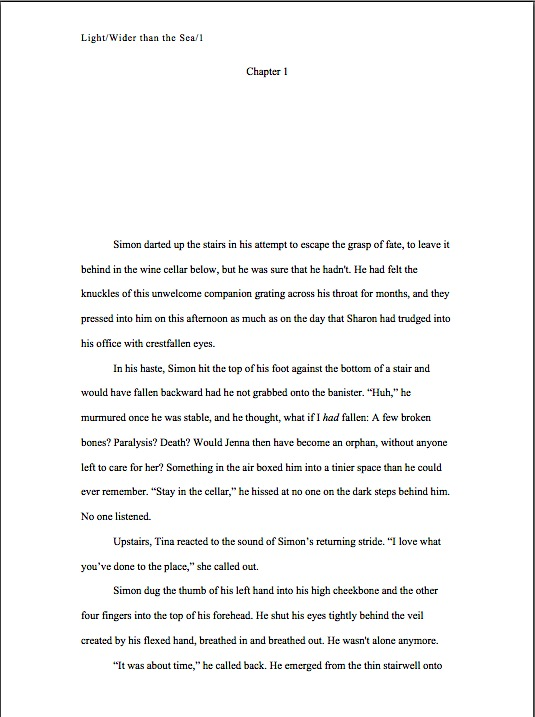
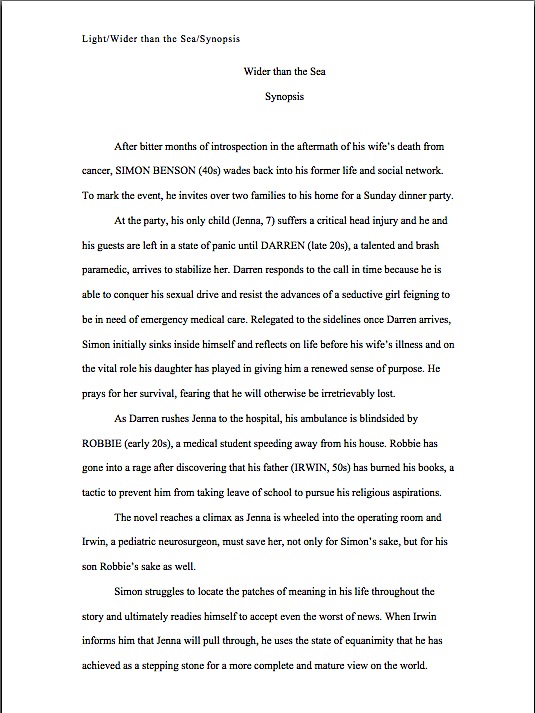
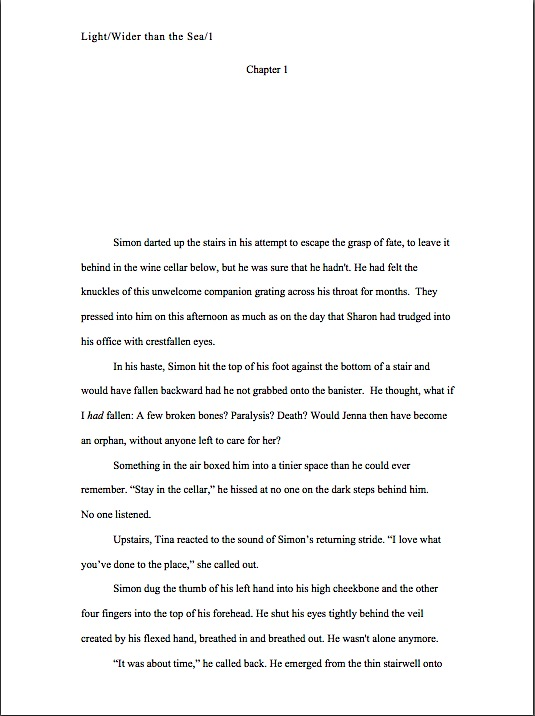
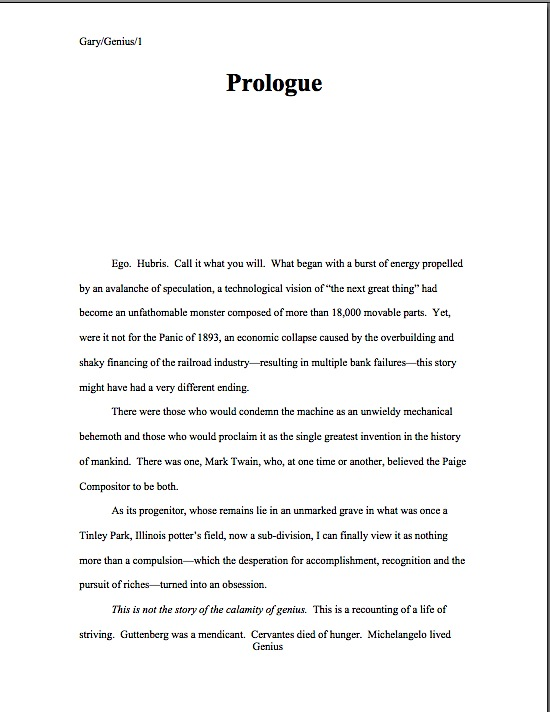
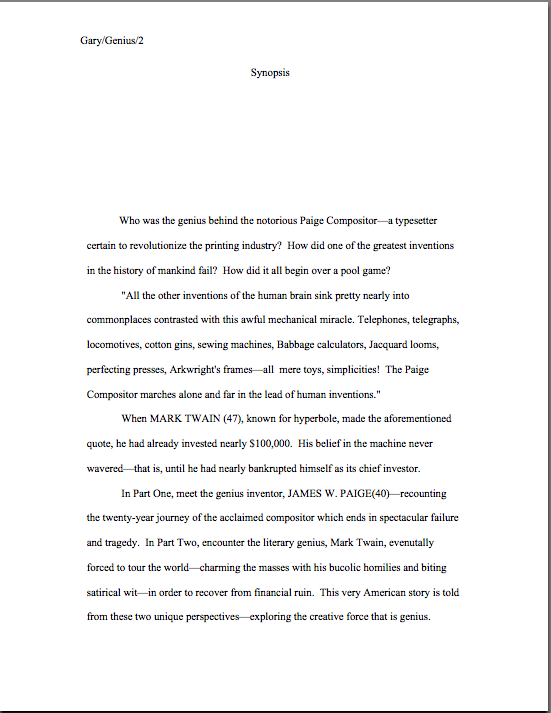
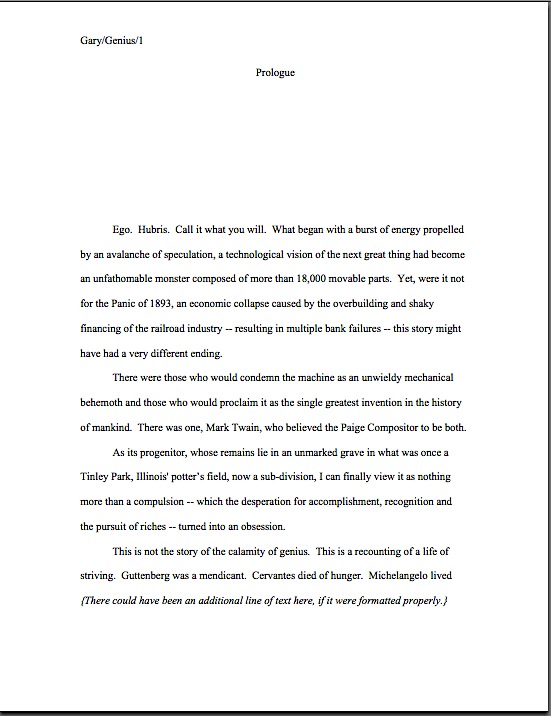


 Please, I implore you, do not put off writing at least a viable first draft of your bio until the day after an agent or editor has actually asked you to provide one. Set aside some time to do it soon.
Please, I implore you, do not put off writing at least a viable first draft of your bio until the day after an agent or editor has actually asked you to provide one. Set aside some time to do it soon.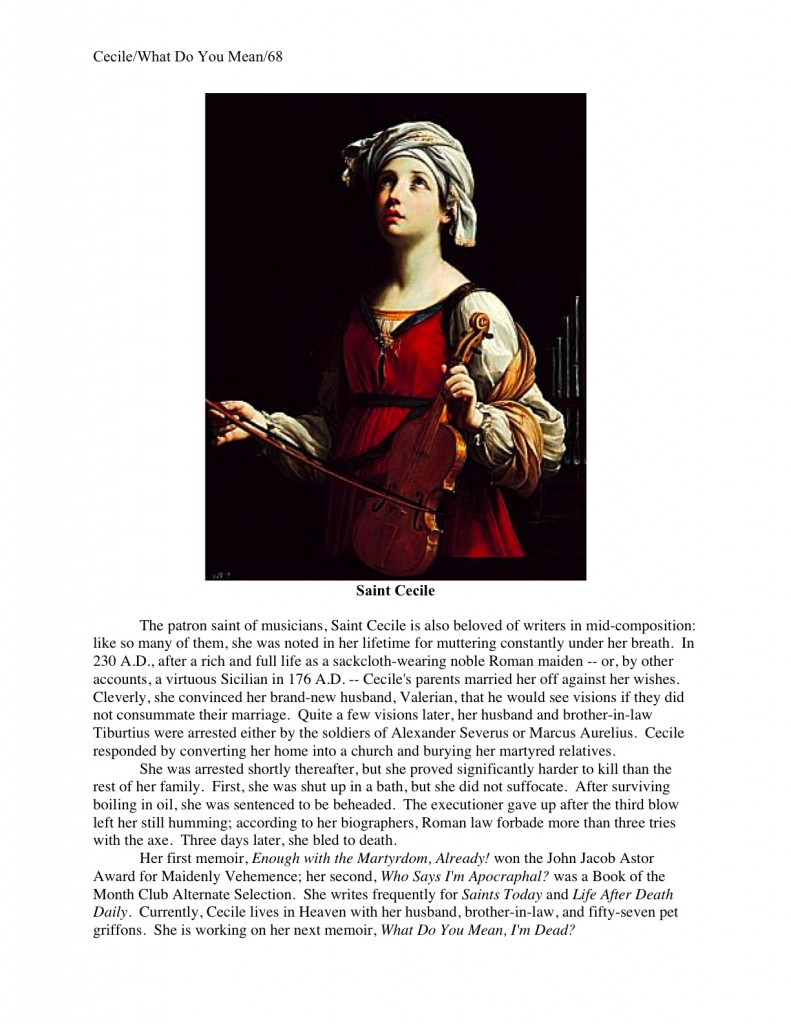
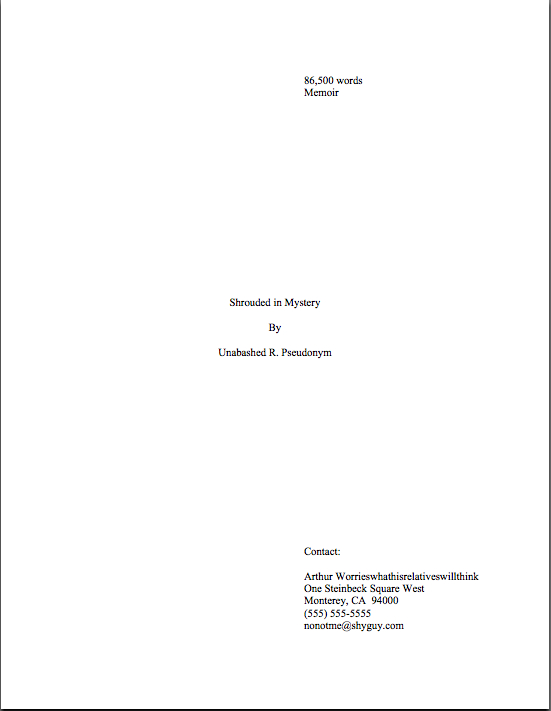
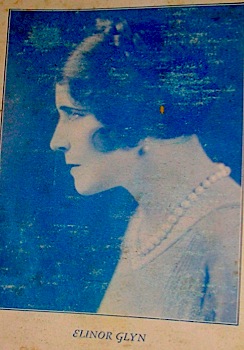



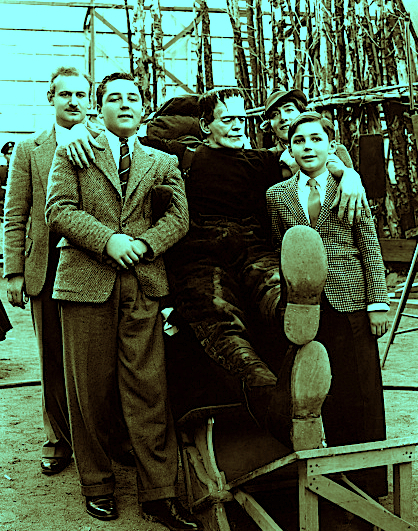










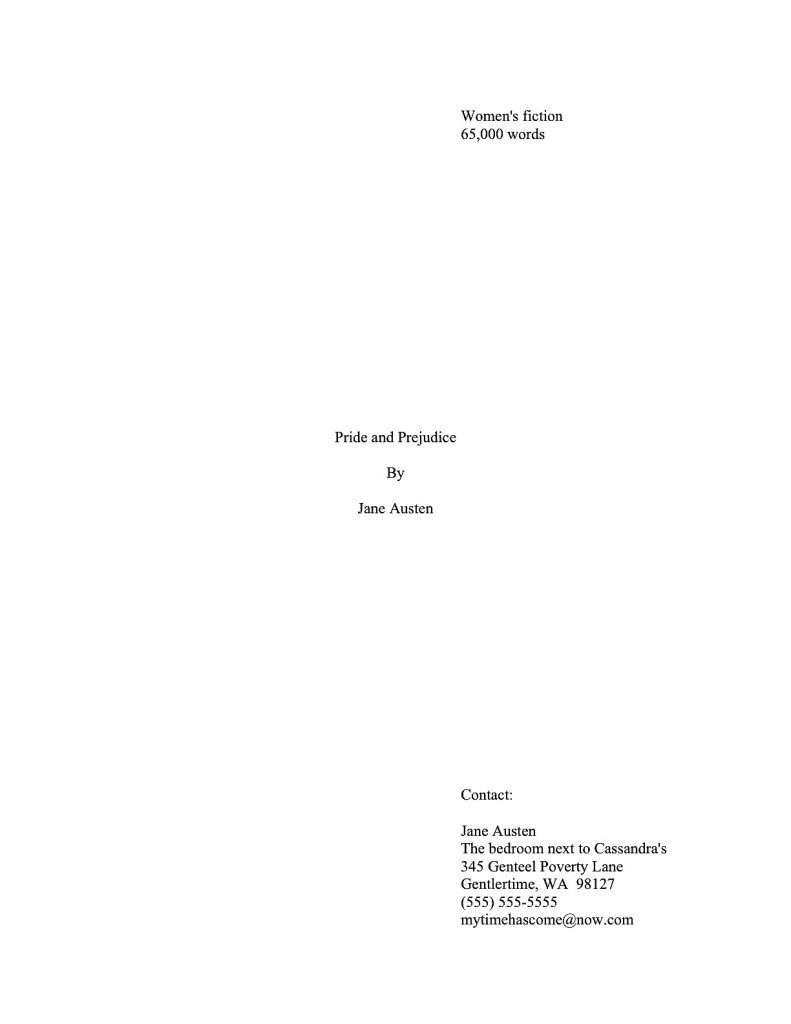
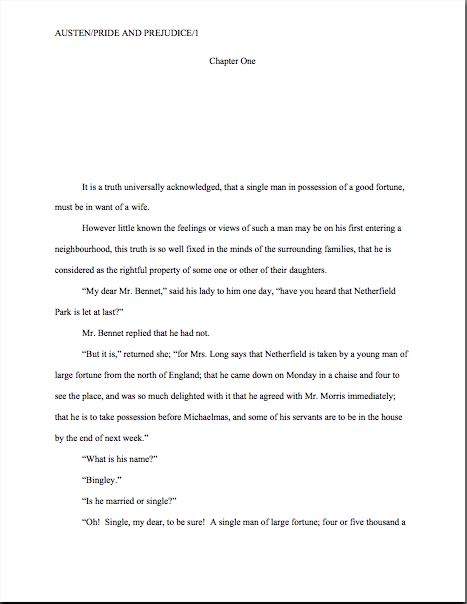






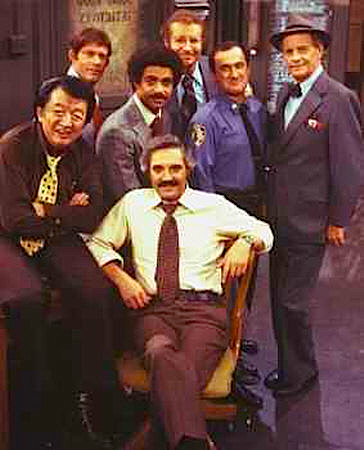

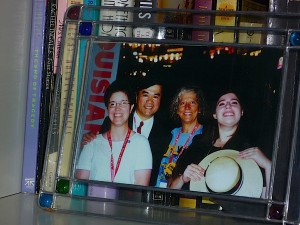


 is not the same thing as this
is not the same thing as this 


